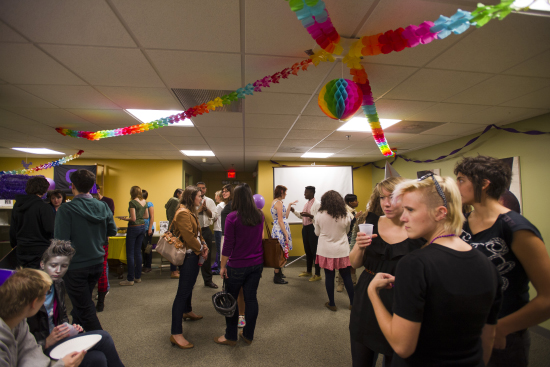Center for Gender, Sexuality, and Activism Welcomes All
WRC’s new name a better fit

The Women’s Resource Center celebrated its third birthday by unveiling its new name: Center for Gender, Sexuality, and Activism. Photo by Cydney Scott
There’s something about board meetings at the Women’s Resource Center that newcomers might not expect.
Center codirector Ariana Katz (CAS’12) invites everyone to settle into a circle of overstuffed armchairs in the George Sherman Union basement. Then she asks them to give their name, energy level, any personal updates, and their preferred gender pronoun. That’s right: their preferred gender pronoun.
Although everyone at a recent meeting said they preferred to be called “female,” it’s no longer assumed to be the case. Last year’s volunteer coordinator, for example, was a man.
“We realized that we’re not just serving women,” says Katz. “A name that says so isn’t doing credit to the community we’ve built.”
That’s part of the reason for the change that leaders announced at the center’s third birthday celebration last Friday: the WRC’s new title—the Center for Gender, Sexuality, and Activism.
The name change aligns with a growing national movement among similar centers and women’s studies program—including BU’s, which changed its name last year to women’s, gender, and sexuality studies—that recognizes that there’s more to gender than just women (or men, for that matter). The center’s revised mission statement now makes clear that members “realize the unique needs of women, queer, and trans students on campus, and strive to serve these facets of our community to the best of our ability.”
“We wanted to be at the forefront, doing what is most relevant now,” says Diane Adamson (CAS’14), the center’s other codirector. Adamson knows of at least four universities that have made a similar change.
The decision was hardly quick or easy. Members debated the issue for more than a year, talking about it with colleagues at the New England Women’s Centers Conference and discussing it at board retreats.
Using the Women’s Resource Center as a name was “sort of like wearing clothes that didn’t fit,” says center faculty advisor Stacy Godnick, assistant dean of the College of General Studies.
So members started throwing out to each other words, ideas, and center activities important to them. The name passed through many variations before emerging as the one announced at the birthday celebration.
“This name change reflects BU’s century of social justice,” Godnick says, referring to the University’s history as the first U.S. college to admit students without regard to sex or race. “The Women’s Resource Center by name, whether with intention or not, excluded, and they don’t want exclusion to be who they are.”
That’s quite a shift from the center’s early days in the ’70s. “When the WRC was founded, there really was a need for women to identify with a place on campus and to feel at home,” says Lizzie Whetstone (CAS’12), the center’s volunteer coordinator. Students finally got that safe space three years ago, when the center’s doors opened in the GSU, next to the Howard Thurman Center . And while the volunteer-run center continues to provide advice and support to sexual assault victims, host discussions on sexuality, abortion, domestic abuse, and sexual health, and hand out contraception, it has a more expansive mission, one that recognizes that everyone, regardless of gender or sexual identity, needs a safe space on campus.
Deborah Belle, a College of Arts & Sciences professor of psychology and director of the women’s, gender, and sexuality studies program, “needed a brief moment to mourn the loss of women in the title,” but admires members for their serious deliberation and is confident that the new name and expanded vision for the center will be successful.
“I’ve seen so many male-bodied people dance on the threshold of our door because they think this is a women’s-only space,” Katz says. “Right now this is not what this place is or who it needs to serve. We want everyone in here.”
That message resonated with Loren Golubic-Campbell (CAS’12). The off-campus student recently burrowed under a blanket doing homework on one of the center’s comfortable couches. “I wasn’t really sure about the name,” says Golubic-Campbell. “I’m gender-queer, and I felt pretty nervous about being in the women’s center because I don’t usually hang out with women.”
Above her hangs a blackboard-like poster reading, “This Place Is …,” with words like “bumpin’,” “FRIENDLY,” and “Activism” chalked in. Many members and supporters are jazzed about that last word, now part of the center’s title. Politically active students groups, like Amnesty International, VOX: Voices for Planned Parenthood, and Q, a queer activist collective, hold meetings at the center. Even Occupy Boston students met there two weeks ago, with the encouragement of members.
“Activism is what keeps us running,” Adamson says. “I think that by changing the name to reflect that, we’re really representing ourselves better.”
Whetstone agrees: “We’re giving ourselves credit for what we’re doing.”
Comments & Discussion
Boston University moderates comments to facilitate an informed, substantive, civil conversation. Abusive, profane, self-promotional, misleading, incoherent or off-topic comments will be rejected. Moderators are staffed during regular business hours (EST) and can only accept comments written in English. Statistics or facts must include a citation or a link to the citation.